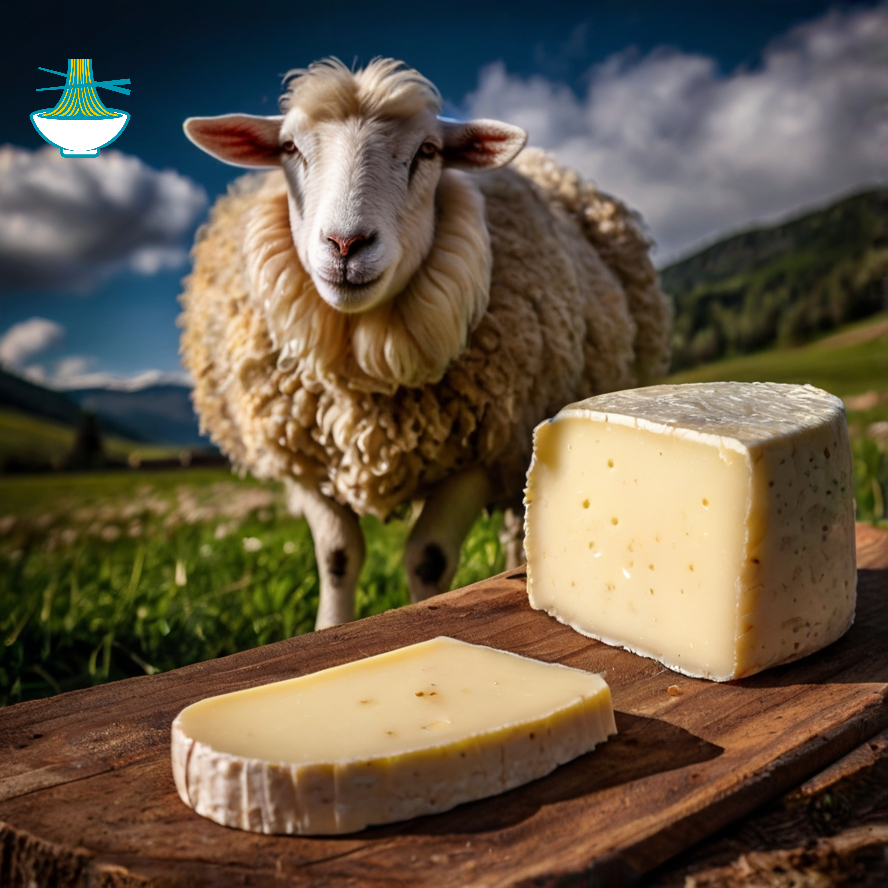Byaslag is a traditional Mongolian cheese made primarily from sheep's or goat's milk. The process begins with milking the animals and heating the milk to a lukewarm temperature. Rennet or a natural souring agent is then added to coagulate the milk, forming curds. These curds are carefully cut and stirred, then cooked at a low temperature to release whey. The curds are then drained, pressed, and sometimes salted, before being aged to develop flavor. The final product is a firm, slightly tangy cheese that can vary in texture from crumbly to creamy.
Byaslag has deep roots in Mongolian nomadic culture, dating back centuries. It has been a staple in the diet of Mongolian herders, providing a reliable source of nutrition in the harsh climate of the steppes. The traditional methods of making Byaslag have been passed down through generations, often performed by women using simple, rustic equipment. This cheese is not only a food item but also a part of Mongolian heritage, reflecting the resourcefulness and self-sufficiency of the nomadic lifestyle. Its preparation and consumption are often tied to community gatherings and seasonal celebrations, highlighting its cultural significance.
Ingredients:
- 1 gallon sheep's or goat's milk
- 1/4 teaspoon rennet (or natural souring agent)
- Salt (optional)
Method of Preparation:
1. Heat the Milk: Pour the milk into a large pot and gently heat it to a lukewarm temperature (around 86°F or 30°C).
2. Add Rennet: Dissolve the rennet in a small amount of cool water, then add it to the milk. Stir gently to mix.
3. Coagulate: Let the milk sit undisturbed for about an hour, or until it coagulates and forms curds.
4. Cut the Curds: Once the milk has set, cut the curds into small cubes using a long knife.
5. Cook the Curds: Slowly heat the curds to about 105°F (40°C), stirring occasionally to prevent sticking. Maintain this temperature for about 30 minutes.
6. Drain the Whey: Pour the curds and whey into a cheesecloth-lined colander to drain. Let it sit until most of the whey has drained off.
7. Press the Curds: Gather the cheesecloth around the curds and press them with a weight to expel more whey. Press for several hours, or until the cheese reaches the desired firmness.
8. Salt and Age (optional): If desired, lightly salt the cheese for flavor. Allow the cheese to age in a cool, dry place for several days to develop its flavor.
Byaslag can be enjoyed fresh or aged, offering a versatile addition to meals with its slightly tangy flavor and firm texture.
Nutrition Value:
1. 1 Gallon Sheep's or Goat's Milk
Sheep's Milk:
- Calories: Approximately 2,400 kcal
- Carbohydrates: 144 g
- Protein: 160 g
- Fat: 160 g
- Sodium: 560 mg
- Cholesterol: 720 mg
- Vitamins:
- Vitamin A: 11,520 IU
- Vitamin D: 240 IU
- Vitamin B12: 8 µg
- Minerals:
- Calcium: 4,800 mg
- Phosphorus: 3,600 mg
- Magnesium: 480 mg
- Potassium: 2,400 mg
- Zinc: 24 mg
Goat's Milk:
- Calories: Approximately 2,360 kcal
- Carbohydrates: 180 g
- Protein: 128 g
- Fat: 152 g
- Sodium: 720 mg
- Cholesterol: 800 mg
- Vitamins:
- Vitamin A: 14,400 IU
- Vitamin D: 240 IU
- Vitamin B12: 8 µg
- Minerals:
- Calcium: 4,800 mg
- Phosphorus: 3,600 mg
- Magnesium: 320 mg
- Potassium: 2,400 mg
- Zinc: 12 mg
Nutritional Benefits:
- Protein: Essential for muscle growth and repair.
- Calcium: Vital for strong bones and teeth.
- Vitamin A: Important for vision and immune function.
- Vitamin D: Supports bone health by aiding calcium absorption.
- Vitamin B12: Crucial for nerve function and red blood cell formation.
- Potassium: Helps maintain normal fluid balance and supports nerve and muscle function.
2. 1/4 Teaspoon Rennet (or Natural Souring Agent)
Rennet:
- Calories: Negligible
- Carbohydrates: 0 g
- Protein: 0 g
- Fat: 0 g
- Sodium: Trace amounts
- Cholesterol: 0 mg
- Vitamins: Negligible
- Minerals: Negligible
Nutritional Benefits:
- Rennet: Used in very small amounts, it facilitates milk coagulation without significant nutritional contribution.
3. Salt (Optional)
1 Teaspoon of Salt:
- Calories: 0 kcal
- Carbohydrates: 0 g
- Protein: 0 g
- Fat: 0 g
- Sodium: 2,300 mg
- Cholesterol: 0 mg
- Vitamins: 0
- Minerals: Trace amounts of minerals like iodine.
Nutritional Benefits:
- Sodium: Essential for maintaining fluid balance, nerve transmission, and muscle function, but should be used in moderation to avoid health issues like hypertension.
By combining these ingredients, Byaslag cheese provides a rich source of protein, essential vitamins, and minerals, particularly calcium, which supports bone health. The use of sheep's or goat's milk offers additional benefits over cow's milk, such as higher levels of certain nutrients and easier digestibility for some individuals.


Comments